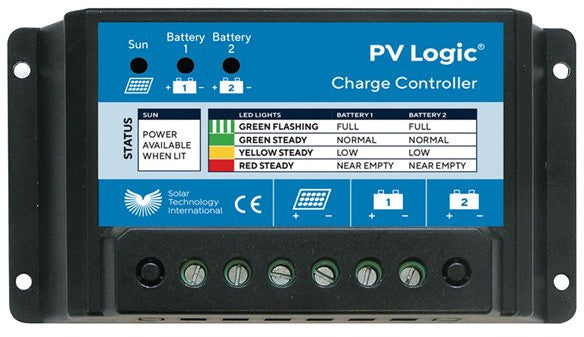
How do solar charge controllers work?
|
|
Time to read 3 min
|
|
Time to read 3 min
The charge controller sits between your solar panel and battery. Although it seems deceptively simple, it actually serves a crucial function in the performance of solar power setups. But you might be asking yourself: How do solar charge controllers work? Read on to understand more about the benefits of using a solar charge controller.
A charge controller is an essential part of battery-based solar energy systems. It regulates the current and/or voltage, protecting batteries from overcharging to keep them safe and efficient. Without a charge controller, a solar panel could continue to deliver power to a battery even if it’s fully charged. The result? Damage to the battery and the dangerous risk of overheating.
Solar charge controllers ensure that batteries receive the right amount of charge while preventing overcharging and damage. As such, they help to maximize the performance and longevity of solar energy systems.
1. Regulation of Charging Process: Solar charge controllers act as the gatekeepers of solar energy systems, managing the flow of electricity from solar panels to batteries. By monitoring the voltage and current generated by the solar panels, charge controllers regulate the charging process to ensure that batteries receive the optimal amount of charge without overcharging. This prevents damage to the batteries and extends their lifespan, ultimately improving the overall efficiency and reliability of the solar energy system.
2. Protection Against Overcharging and Overdischarging: One of the primary functions of solar charge controllers is to protect batteries from overcharging and overdischarging, which can lead to irreparable damage and reduced battery lifespan. Overcharging occurs when batteries receive more charge than they can safely store, leading to electrolyte loss, overheating, and potential explosion. Conversely, overdischarging occurs when batteries are depleted beyond their recommended capacity, causing sulfation and irreversible damage. Solar charge controllers prevent these issues by automatically disconnecting the solar panels from the batteries once they are fully charged and reconnected when the battery voltage drops to a safe level.
3. Optimization of Energy Harvesting: Solar charge controllers optimize the energy harvesting process by maximizing the efficiency of solar panels and batteries. Through advanced algorithms and charging profiles, charge controllers adjust the charging voltage and current to match the requirements of the batteries, ensuring that they are charged efficiently and effectively. This maximizes the amount of energy harvested from the sun and stored in the batteries, improving the overall performance and output of the solar energy system.
4. Remote Monitoring and Control: Many modern solar charge controllers are equipped with advanced features such as remote monitoring and control capabilities, allowing users to monitor and manage their solar energy systems from anywhere in the world. Through mobile apps or web-based interfaces, users can access real-time data on solar panel performance, battery status, and energy consumption, enabling them to optimize system performance and troubleshoot issues remotely. This remote monitoring and control functionality enhance convenience and peace of mind for solar system owners, ensuring that their systems are operating at peak efficiency at all times.
At night, solar panels can cause a slight discharge from the battery by passing current in the reverse direction. The charge controller helps to prevent this, making sure the current only passes through in one direction.
If you continue to feed energy to a fully charged battery, this can cause it to degrade rapidly and even overheat. The charge controller helps to reduce the flow of energy once your battery reaches a specific voltage. If the voltage drops for any reason, the controller allows the maximum possible charge again to keep everything powered up.
Check out our Charge Controllers now to take full control of your solar power system, or explore our full Solar range for more great renewable green energy ideas! If you're still looking for power tech, check out our Power Stations.
Essential Component: Solar charge controllers are crucial for battery-based solar energy systems, regulating current and voltage to protect batteries from overcharging and damage.
Functionality: They ensure batteries receive the right amount of charge, maximizing system performance and longevity.
Regulation of Charging Process: Charge controllers monitor voltage and current from solar panels, adjusting charging to prevent overcharging.
Protection Features: They safeguard batteries from overcharging and overdischarging, enhancing safety and extending battery lifespan.
Optimization and Control: Charge controllers optimize energy harvesting, adjust charging profiles, and often offer remote monitoring and control for system management.
An avid gamer from a young age, Jon has dabbled in gaming journalism and dedicates much of his spare time to this hobby. He also has an interest in music, playing bass guitar in a rock covers band.
Having previously worked as a copywriter with another electronics retailer, he was eager to join Maplin with their new online venture. In addition to writing blogs, Jon also works on many of the website's landing pages and adding new tech to the range.